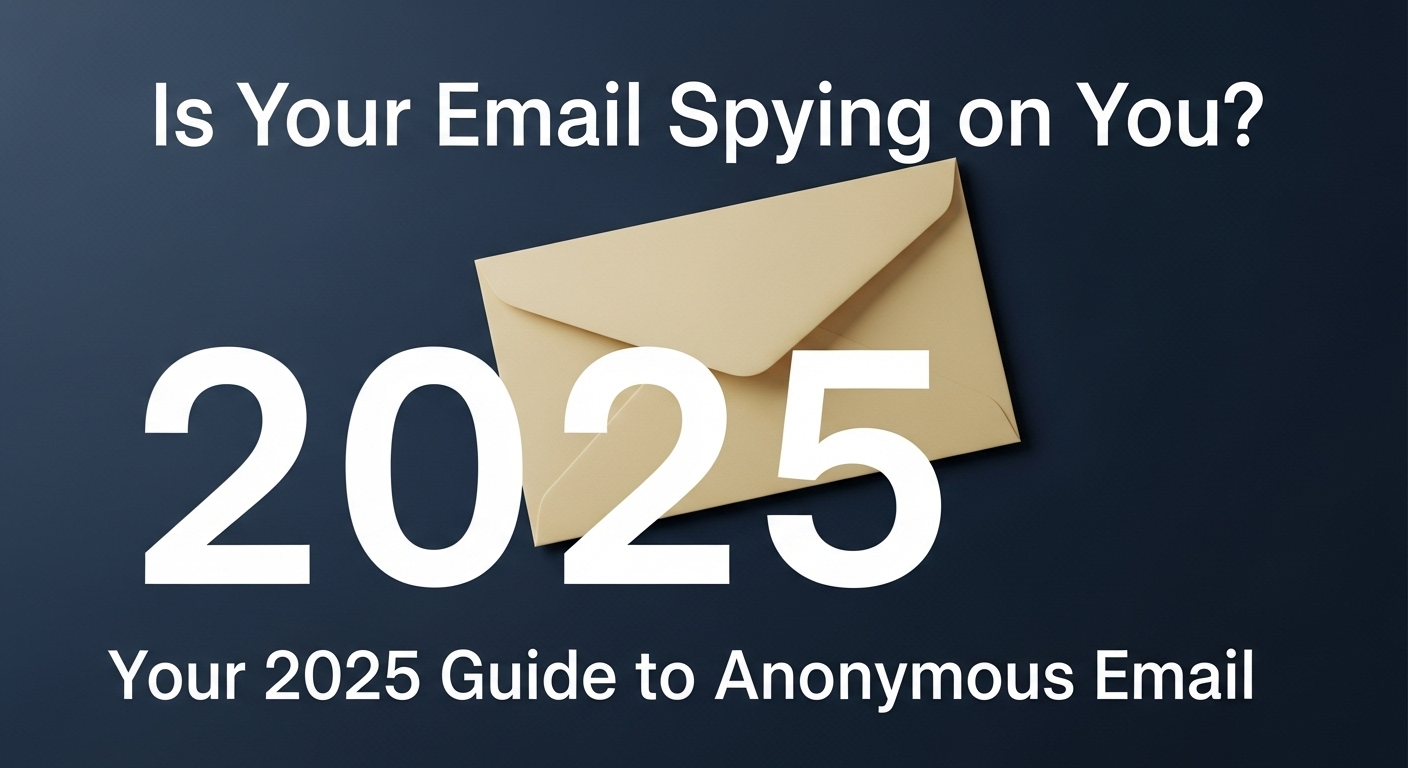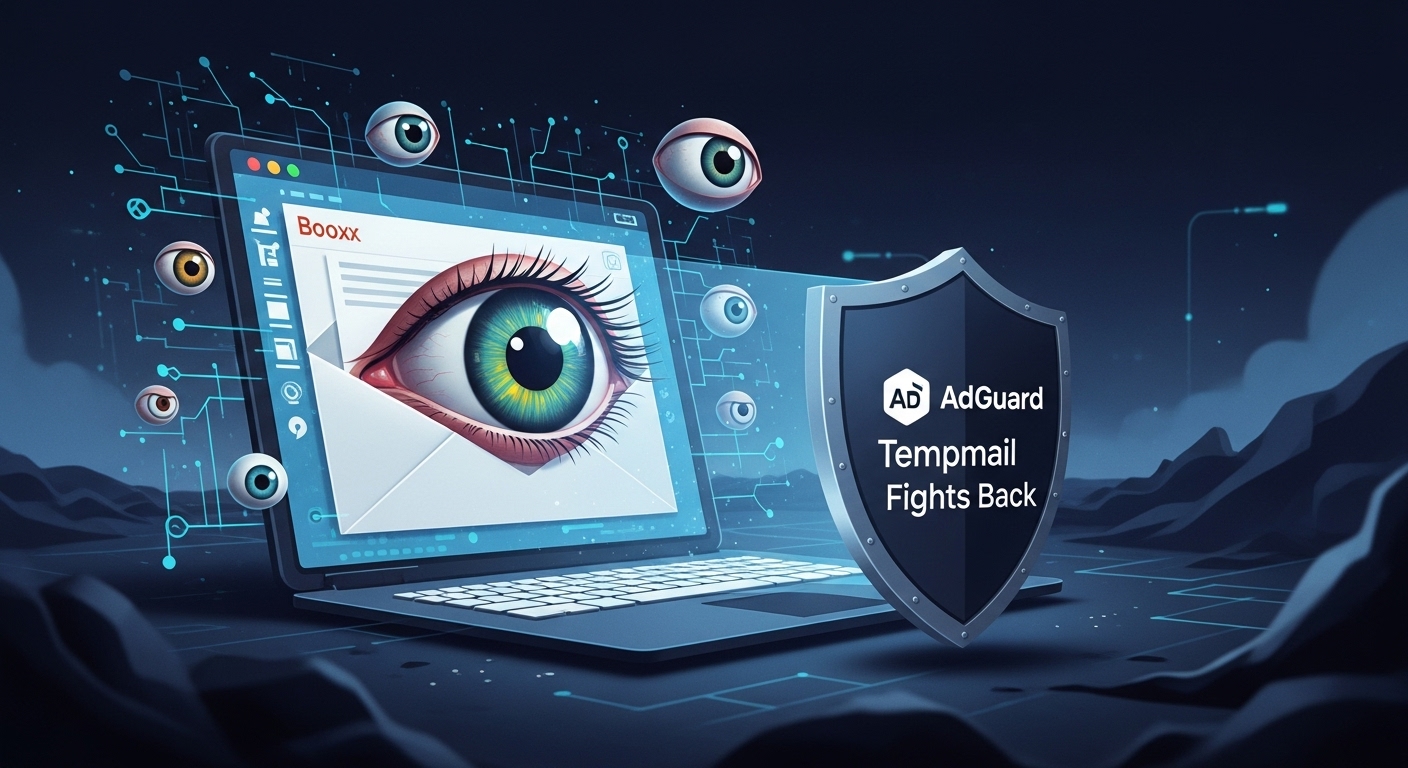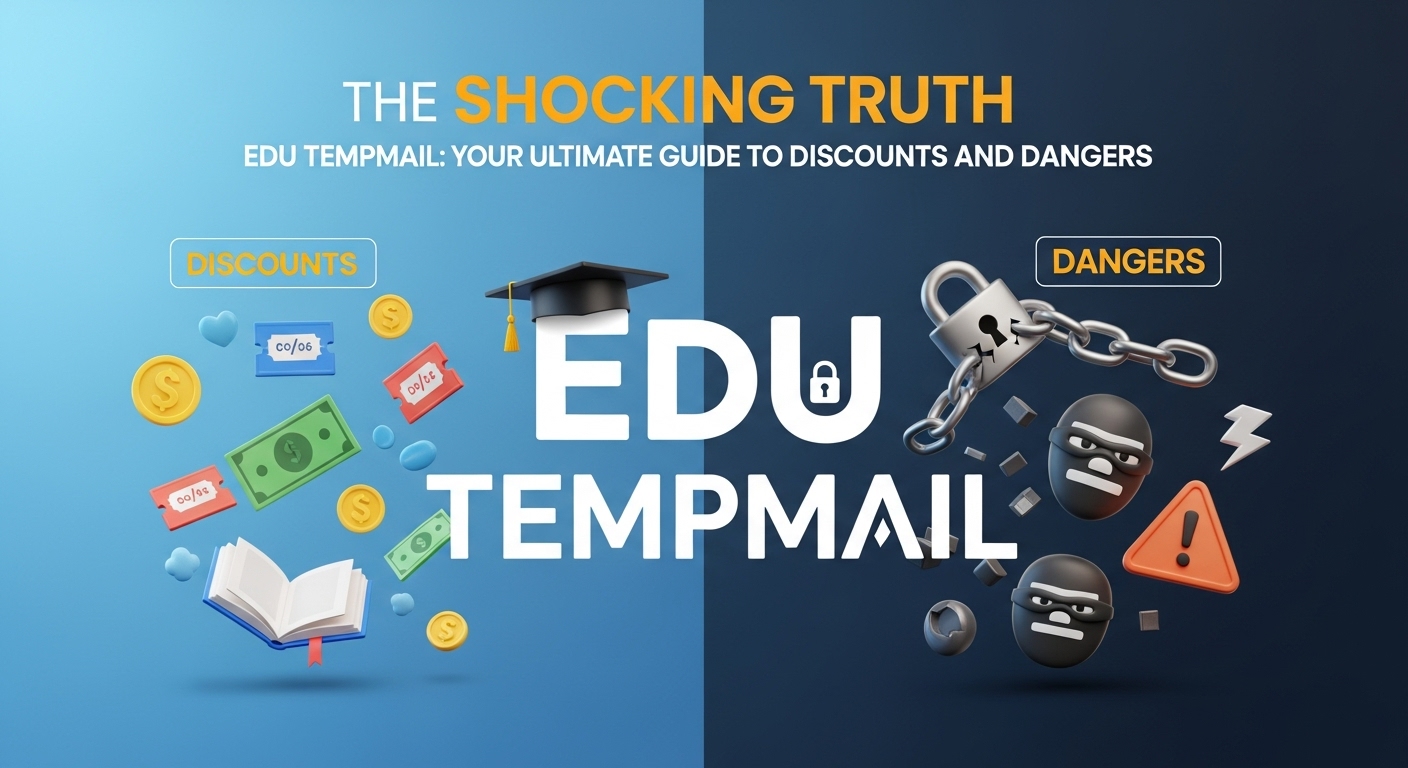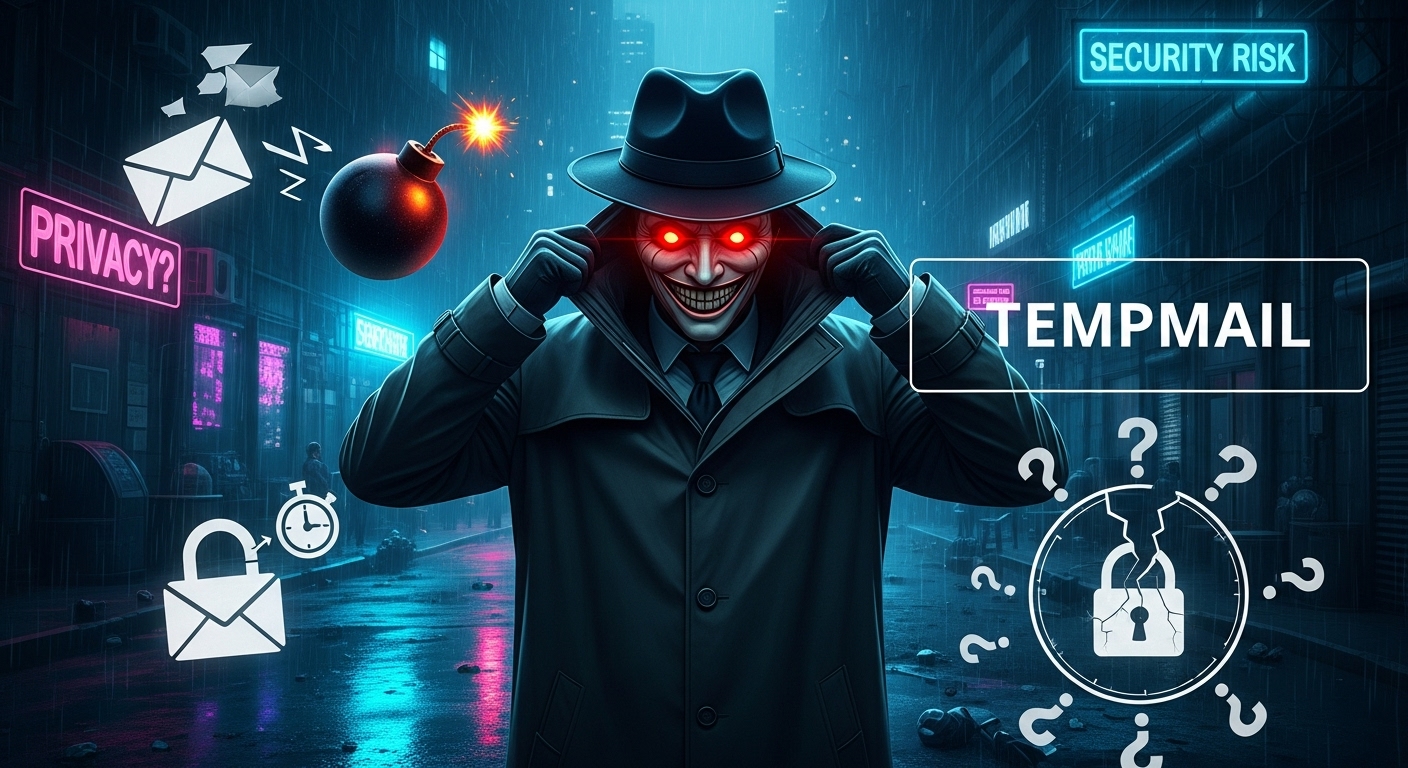Is Your Email Spying on You? Your 2025 Guide to Anonymous Email

Have you ever emailed a friend about a vacation, only to be flooded with travel ads moments later? That’s not a coincidence. It’s a sign. The email services we trust with our most private conversations are often the ones watching us the closest. In today's digital world, we operate under an illusion of privacy. We click "agree" on terms we never read and hand over our data for the convenience of a "free" service. But the cost is higher than we think.
The numbers paint a stark picture. A staggering 92% of Americans are concerned about their privacy when using the internet. And for good reason. Businesses are collecting more data than ever, with 68% of consumers expressing unease about the sheer volume of information being gathered about them. This isn't just about ads. It's about a fundamental breakdown of trust. Data breaches are now a common occurrence, with customer Personally Identifiable Information (PII) being exposed in more than half of all incidents. Your email address is the key to your digital kingdom, and it's being left unguarded.
This is where the concept of an anonymous email comes in. It's more than just a tool for spies and hackers; it's a shield for everyday people. It's about reclaiming your right to have a private conversation in an era of mass surveillance and corporate data mining. This guide is your first step toward digital sovereignty. We will pull back the curtain on how your data is being used and give you the tools and knowledge to protect yourself.
What is an Anonymous Email?
Before we dive deeper, let's establish what we mean by "anonymous email." True anonymity goes beyond simply hiding your name. An anonymous email is a message sent without revealing any part of the sender's real-world identity.
This means it must have:
- No Personally Identifiable Information (PII): The account isn't tied to your real name, phone number, or home address.
- No IP Address Exposure: Your device's unique IP address, which can reveal your physical location, is masked and not included in the email's data.
- No Traceable Metadata: The hidden data within the email (the headers) doesn't contain information that can be traced back to you.
To make it even clearer, let's compare them side-by-side.
| Feature | Standard Email (e.g., Gmail) | Burner/Disposable Email (e.g., Guerilla Mail) | Anonymous Email (e.g., ProtonMail) |
| Primary Goal | Convenience & Features | Spam Avoidance & Quick Sign-ups | Security & Long-Term Privacy |
| Identity Link | High (Requires name, phone number) | None (No registration required) | None (Anonymous sign-up) |
| IP Address Tracking | Yes, IP is logged and often in headers | Sometimes, varies by provider | No, IP is hidden or stripped |
| Message Encryption | In-transit (TLS), but provider can read | None or minimal | End-to-End (Provider cannot read) |
| Lifespan | Permanent | Temporary (Minutes to hours) | Permanent |
| Best For | Everyday communication | One-time website sign-ups, downloads | Sensitive communication, protecting identity |
Why Go Incognito? Legitimate Reasons to Use an Anonymous Email Account
There's a common misconception that only people with something to hide need anonymity. The reality is that privacy is a fundamental right, not a sign of wrongdoing. An anonymous email account is a vital tool for countless legitimate, ethical, and even heroic purposes. It empowers the vulnerable and holds the powerful accountable.
Here are some of the most important reasons people choose to go incognito:
- Protecting Whistleblowers and Ethical Reporting: Imagine an employee who discovers their company is dumping toxic waste or engaging in massive financial fraud. Reporting this publicly could cost them their job, their reputation, or worse. An anonymous email provides a safe channel to leak critical information to journalists or regulators without fear of retaliation, ensuring misconduct doesn't stay hidden in the shadows.
- Safeguarding Journalistic Sources: Investigative journalism is a pillar of democracy. Reporters often rely on sources inside powerful organizations to uncover the truth. The entire Watergate scandal, which brought down a U.S. president, was famously fueled by an anonymous source known as "Deep Throat". Protecting a source's identity is paramount; an anonymous email service ensures that this sensitive communication remains confidential, protecting both the journalist and the source from exposure.
- Enabling Activism and Free Speech: In countries with oppressive regimes and heavy internet censorship, speaking out against the government can be a life-threatening act. Anonymous communication tools allow activists and citizens to organize, share information, and express dissent without putting themselves in immediate danger.
- Ensuring Personal Safety: The need for privacy extends to our personal lives. Consider these scenarios:
- Online Dating: Communicating with a potential match without revealing your primary email address until you feel safe and comfortable.
- Community Forums: Participating in discussions on controversial topics without exposing yourself to online harassment or doxing.
- Reporting Abuse: Safely reporting abuse or illegal activity without revealing your identity and risking retaliation from the perpetrator.
- Avoiding Spam and Corporate Tracking: This is the most common, everyday reason. Every time you sign up for a newsletter, download an e-book, or enter a contest, you're handing your email address over to marketing lists. Using a disposable address from a service like(https://temptomail.org) or a dedicated anonymous alias keeps your primary inbox clean and prevents advertisers from building a detailed profile of your online activities.
- Maintaining Professional Discretion: Businesses also have legitimate needs for anonymity. This could involve a company conducting market research on a competitor without tipping them off, a recruiter making a discreet inquiry about a potential candidate, or a security team performing penetration testing on their own systems.
When Anonymity is Used for Harm
To have an honest conversation about anonymous email, we must also acknowledge its dark side. The same shield that protects a whistleblower can also embolden a criminal. This is often referred to as the "online disinhibited effect"—when people feel they can't be held accountable for their actions, their behavior can worsen. Understanding these risks is key to promoting responsible use and building a safer internet for everyone.
- Phishing and Scams: This is by far the most prevalent malicious use of email. An estimated 3.4 billion phishing emails are sent every single day. Attackers use spoofed or anonymous addresses to impersonate trusted entities like your bank, a delivery service, or even your boss. Their goal is to trick you into clicking a malicious link, downloading malware, or revealing sensitive information like passwords and credit card numbers.
- Online Harassment and Cyberbullying: Anonymity can remove the social consequences that normally deter abusive behavior. It allows bullies to send threatening messages, spread rumors, and engage in targeted harassment without immediate fear of being identified. This can be devastating for victims, especially since studies show that in up to 50% of cyberbullying cases, the victim does not know the identity of their tormentor. In one tragic case, an anonymous user on the Tutanota service used the platform to blackmail someone with sensitive photos and personal information.
- Spreading Disinformation and Illegal Content: Anonymous channels can be exploited to spread propaganda, hate speech, and illegal materials. By obscuring the origin, bad actors can make it more difficult for platforms and law enforcement to trace and shut down these operations.
The Best Anonymous Email Providers of 2025
Now for the most important part: choosing the right tool to protect your privacy. The market for secure and anonymous email has grown significantly, but not all providers are created equal. A truly secure service should meet several key criteria:
- Anonymous Sign-up: It should not require any personal information, like your name or phone number, to create an account.
- End-to-End Encryption (E2EE): The content of your emails must be encrypted on your device and only decrypted on the recipient's device, making it unreadable to the provider.
- No IP Logging: The service must not record or store your IP address, which could be used to identify your location.
- Strong Jurisdiction: It should be based in a country with robust data privacy laws, like Switzerland or Germany, outside the reach of invasive surveillance programs.
With these criteria in mind, here is a breakdown of the top anonymous and private email providers for 2025.
Top-Tier Anonymous Email Services
- ProtonMail: The undisputed leader in the secure email space. Created by scientists at CERN, ProtonMail is based in Switzerland, benefiting from some of the world's strongest privacy laws.
- Key Features: It offers robust end-to-end encryption, a strict zero-knowledge policy (meaning not even they can read your emails), and unique features like self-destructing messages.
- Downsides: The free plan has storage limits, and due to its use of the OpenPGP standard, it does not encrypt email subject lines or metadata.
- Best For: Anyone seeking a powerful, user-friendly, and highly reputable secure email provider for long-term use.
- Tuta (formerly Tutanota): A close competitor to ProtonMail, Tuta is based in Germany and takes a slightly different approach to security.
- Key Features: Tuta's biggest advantage is that it encrypts your entire inbox—including subject lines, your address book, and your calendar. It is also fully open-source, allowing its code to be audited for security by anyone.
- Downsides: It uses a proprietary encryption standard, meaning it's not compatible with other PGP-based services. This creates a "walled garden" effect.
- Best For: Users who prioritize maximum encryption above all else and don't need to communicate with external PGP users.
- Mailfence: A feature-rich secure email provider based in Belgium, another country with strong privacy protections.
- Key Features: Mailfence uses the OpenPGP standard (like ProtonMail) but also offers a full suite of productivity tools, including an encrypted calendar, contacts, and document storage. It supports interoperability with other email clients like Thunderbird, giving users more flexibility than Tuta.
- Downsides: Sign-up requires a verification email, though you can use a disposable one to maintain anonymity.
- Best For: Professionals and teams who need a secure, private alternative to Google Workspace or Microsoft 365.
Your Step-by-Step Guide to Sending a Truly Anonymous Email
Sending a truly anonymous email isn't just about picking the right service; it's about following a careful process. True anonymity is achieved through layers of security, where each step closes a potential loophole that could reveal your identity.
Think of it like a secret agent delivering a message. They don't just use an alias; they also use a secure route and make sure the message itself contains no clues. Here is a beginner-friendly, step-by-step guide to achieving a high level of email anonymity.
Step 1: Choose Your Secure Email Provider
First, select a provider that is built for privacy. Refer to the comparison table in the previous section to make your choice. For this guide, we'll assume you've chosen a top-tier service like ProtonMail or Tuta, which don't require personal information to sign up.
Step 2: Hide Your IP Address with a VPN or Tor
This is the most critical step and the one most beginners miss. Even if your email provider doesn't log your IP address, your Internet Service Provider (ISP)—like Comcast, Verizon, or AT&T—can see every website and service you connect to. They know you're visiting ProtonMail's website.
To prevent this, you must mask your IP address before you even create your account.
- Use a VPN (Virtual Private Network): A reputable, no-logs VPN service creates an encrypted tunnel for all your internet traffic. Your ISP can only see that you're connected to a VPN server; they can't see what you're doing after that. When you visit the email provider's site, they will see the VPN's IP address, not yours. Avoid free VPNs, as they often log your activity and sell your data.
- Use the Tor Browser: The(https://www.torproject.org/) provides even stronger anonymity by routing your traffic through a series of volunteer-run servers around the world, making it nearly impossible to trace the origin. Many secure email providers, including ProtonMail, even have their own special .onion sites for maximum security when accessed via Tor.
Step 3: Create Your Anonymous Account
With your VPN or Tor activated, navigate to your chosen email provider's sign-up page. Now, follow these rules carefully:
- Use a Pseudonym: Create a username and display name that have no connection to your real identity.
- Do Not Provide Real Information: If asked for a name or other details, use fake, non-identifiable information.
- Decline Recovery Options: Do NOT link a recovery email address or phone number. While convenient, this creates a direct link back to your real identity, defeating the purpose of anonymity.
- Use a Strong, Unique Password: Do not reuse a password from any other account. Use a trusted password manager to generate and store a long, random password that you don't have to remember.
Step 4: Compose and Send Your Message Securely
You now have an anonymous account created from a hidden IP address. The final step is to ensure the message itself doesn't betray you.
- Avoid Personal Details: Be extremely careful not to include any personally identifiable information in the email body, the subject line, or even the names of any attachments.
- Scrub Metadata from Attachments: Files like photos and documents can contain hidden metadata, including the device used to create them and sometimes even GPS coordinates. Use a metadata scrubbing tool before attaching any files.
- Use Security Features: If your provider offers them, take advantage of features like self-destructing messages or password-protected emails. For example, with ProtonMail, you can send an encrypted email to a non-ProtonMail user that requires a pre-shared password to open.
By following these four steps, you create multiple layers of protection. The VPN/Tor hides your location, the anonymous provider protects your account, and your careful composition protects the message content.
The Law & Anonymity: Are You Breaking the Rules?
One of the biggest questions people have is straightforward: "Is sending an anonymous email illegal?" The answer, in most democratic countries, is a clear and resounding no.
The act of communicating anonymously is not only legal but is considered a fundamental component of free speech. In the United States, the Supreme Court has repeatedly affirmed this right. In the landmark case McIntyre v. Ohio Elections Commission, the court stated, “Anonymity is a shield from the tyranny of the majority… It thus exemplifies the purpose behind the Bill of Rights and of the First Amendment in particular: to protect unpopular individuals from retaliation”. Online anonymity allows people to express dissenting opinions, criticize those in power, and discuss sensitive topics without fear.
However, this is where a critical distinction must be made:
The tool (anonymity) is legal. Using that tool to commit a crime is not.
Your right to anonymity ends where another person's right to safety begins. While you are free to send an anonymous email, you are not free to use it for illegal activities. These include:
- Harassment and Stalking: Using an anonymous account to threaten, intimidate, or repeatedly harass someone is a crime under laws like the U.S. federal cyberstalking statute (18 U.S.C. § 2261A).
- Making Threats: Transmitting threats of violence or extortion across state lines via email is illegal (18 U.S.C. § 875).
- Fraud and Scams: Using anonymity to conduct phishing attacks, impersonate someone for financial gain, or commit fraud is a serious crime.
- Defamation: Knowingly publishing false statements that harm someone's reputation can lead to civil lawsuits, where courts may compel a provider to reveal a user's identity.
Conclusion:
The digital world has been built on a trade-off: your privacy for convenience. We've been led to believe that constant tracking and data collection are the unavoidable costs of a connected life. But this is a false choice. The rise of anonymous email and other privacy-centric tools proves that a different path is possible—one where you are in control of your own data.
Frequently Asked Questions (FAQ) About Anonymous Email
Can an anonymous email be traced?
It is very difficult, but not impossible. If you use a top-tier secure email provider (like ProtonMail) combined with a high-quality, no-logs VPN or the Tor Browser, it becomes nearly impossible for most parties to trace the email back to you. However, no system is 100% foolproof against a highly sophisticated and determined adversary (like a state-level actor). The most common point of failure is user error, such as including personal information in the message or not using a VPN.
Is ProtonMail truly anonymous?
ProtonMail offers a very high level of anonymity. It does not require personal information for sign-up, does not log IP addresses, and uses a zero-knowledge policy so it cannot read your emails. However, it's not perfectly anonymous by default. It does not encrypt email subject lines, and on rare occasions, it may require some form of verification (like an SMS or another email) to prevent spam, which could create a link to your identity if not done carefully.
What is the best free anonymous email account?
This depends entirely on your needs.
- For secure, long-term communication: The free plans from ProtonMail or Tuta are the best choices. They offer robust encryption and strong privacy features.
- For quick, disposable, one-time use: Guerilla Mail is the top option. It requires no sign-up and emails expire after an hour, making it perfect for avoiding spam.
Is it illegal to send an anonymous email?
No, the act of sending an anonymous email is not illegal in most countries, including the United States. It is widely recognized as a form of free speech. However, it is illegal to use an anonymous email to commit crimes such as harassment, making threats, stalking, or fraud. The law prosecutes the illegal act, not the tool used to perform it.
Do I really need a VPN to send an anonymous email?
For the highest level of anonymity, yes. A VPN is essential. While a secure email provider protects the content of your message, a VPN hides your connection. It prevents your Internet Service Provider (ISP) from knowing you are using an anonymous service and hides your real IP address from the email provider itself, adding a critical layer of protection.
What is the difference between an anonymous and a burner email?
A burner email is typically a temporary or secondary account used for a short-term purpose, mainly to avoid spam when signing up for services. An anonymous email service is a permanent, highly secure inbox designed for long-term, private communication where protecting the sender's identity is the primary goal.
How do anonymous email services make money?
Most reputable anonymous email providers operate on a "freemium" business model. They offer a free plan with basic features and limited storage to attract users. They make money by selling premium subscriptions that offer more storage, custom domain support, additional aliases, and other advanced features. This model ensures their revenue comes from users who value privacy, not from selling data or showing ads.
Can I send an anonymous email from Gmail?
Not in any meaningful way. You can create a Gmail account using fake information, but Google's business model is built on data collection. Google will log your IP address, require phone number verification, and scan your emails for advertising purposes. This makes any Gmail account easily traceable back to you by Google and, by extension, law enforcement.
What is an email alias?
An email alias is a unique, forwarding email address that shields your real inbox. When someone sends a message to your alias (e.g., newsletter-alias@simplelogin.com), it is automatically forwarded to your primary email address (e.g., your-real-name@gmail.com). The sender never sees your real address. If the alias starts receiving spam, you can simply delete it without affecting your main account.
What is end-to-end encryption?
End-to-end encryption (E2EE) is a security method that scrambles a message on the sender's device and ensures that only the intended recipient's device can unscramble it. This means that no one in between—including the email service provider, hackers, or government agencies—can read the content of the message. It's like sending a letter in a locked box that only the recipient has the key to open.
What are email headers and why do they matter for privacy?
Email headers are the hidden metadata attached to every email, containing technical information about its journey from sender to recipient. Crucially, headers often include the sender's IP address, which can reveal their physical location. Secure email services strip this information, and using a VPN prevents your real IP from being recorded in the first place, which is essential for maintaining anonymity.
Outbound Link Example: For more information on the technical aspects of online privacy, the Electronic Frontier Foundation (EFF) is an excellent resource.
Please don’t forget to leave a review of my article.
You Might Also Like
Is Your Inbox Spying on You? Here’s How AdGuard Tempmail Fights Back
Have you ever paused before entering your email address into a new website, feeling a slight hesitation? That feeling is...

The Shocking Truth About Edu Tempmail: Your Ultimate Guide to Discounts and Dangers
Imagine getting over 60% off Adobe Creative Cloud and half-price Amazon Prime. What if you could get those deals without...

Why Your Hotmail Is a Privacy Nightmare (And How Temp Mail Can Save You)
Did you know that nearly half of all emails sent worldwide are spam? In 2024, spam accounted for a staggering 47.27% of ...

The Ultimate Deception: Is Tempmail Safe, or a Ticking Time Bomb?
Your email inbox is more than just a place for messages. It's the digital key to your entire online life. Every password...

The Ultimate Betrayal: How Your Inbox Is Selling You Out (And How to Use Tempmail to Stop It)
Your inbox is a battlefield. Every single day, a war is waged for your attention, your data, and your money. Don't belie...

Your Digital Shield: The Astonishing Truth About How Temp Mail Works
Opening your email inbox can feel like walking into a battlefield. You’re constantly dodging a barrage of promotional ju...

